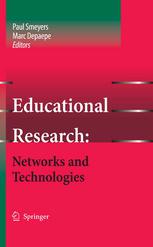

Most ebook files are in PDF format, so you can easily read them using various software such as Foxit Reader or directly on the Google Chrome browser.
Some ebook files are released by publishers in other formats such as .awz, .mobi, .epub, .fb2, etc. You may need to install specific software to read these formats on mobile/PC, such as Calibre.
Please read the tutorial at this link: https://ebookbell.com/faq
We offer FREE conversion to the popular formats you request; however, this may take some time. Therefore, right after payment, please email us, and we will try to provide the service as quickly as possible.
For some exceptional file formats or broken links (if any), please refrain from opening any disputes. Instead, email us first, and we will try to assist within a maximum of 6 hours.
EbookBell Team

5.0
18 reviewsThere have always been networks in the context of educational research as well as particular technologies. Yet recent developments in ICT have put their mark on contemporary education and on educational research and more in general on knowledge and understanding. Does the ‘network society’ and its supporting technologies constitute a thoroughly radical innovation in social practice? Does information technology poison the minds of the younger generation? Do educational institutions have to be transformed in order to effectively serve the needs of the twenty-first century? And what are the implications of these changes for educational research and for researchers themselves?
In this book distinguished philosophers and historians of education focus on the way ‘networks’ and ‘technologies’ characterize education and educational research nowadays. Attention is paid for instance to online networks as ‘spaces’ and ‘places’ that are changing research practices and relations, to the involvement of the researcher in the moral debate, but also to particular educational technologies such as the use of experts’ advice concerning Internet use, the American True Love Waits movement and the practice of punishment in schools.
"This groundbreaking book records the intellectual struggles of a diverse and distinguished group of scholars as they come to grips with the changes in knowledge production, and modes of research communication, engendered by contemporary information and communications technology. The book performs a major service in placing the phenomenon of networks - their potentialities and also their dangers - squarely on our intellectual agenda."
D.C. Phillips, Professor Emeritus of Education and Philosophy, Stanford University
"In this book, a rich array of international scholars in the philosophy and history of education address a pressing concern in contemporary educational research and educational practice: the impact of information technology and networks. The authors are strikingly successful, both in explicating the effects of these changes on both domains and in subverting these effects by pointing out the ironies and continuities lodged beneath technology's veneer of utility and novelty."
David F. Labaree, Professor of Education, Stanford University
This publication is realized by the Research Community (FWO-Vlaanderen / Research Foundation Flanders, Belgium) Philosophy and History of the Discipline of Education: Evaluation and Evolution of the Criteria for Educational Research. Also realized by the Research Community is Educational Research: Why "What Works" Doesn’t Work, which appeared in 2006.